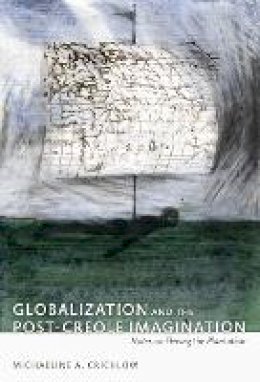“This is a demanding and provocative text. . . . Crichlow makes a number of insightful interventions, usually by way of pinpointing a problem in how creolization has been used and then bringing new analogies into play.” - Huon Wardle, Journal of the Royal Anthropological Institute “This provocative book will surely attract attention with its signal contribution to the rich interdisciplinary arena of scholarship on colonial and postcolonial discourse, history, anthropology, philosophy, political science, literary criticism, and of course Caribbean studies. . . . The book is dense, and not something to absorb in one sitting; it savors like a fine wine.” - AnÍbal JosÉ Aponte ColÓn, Caribbean Studies “One of the prominent features of Globalization and the Post-Creole Imagination is its narrative, methodology, and eclectic approach. Instead of one grand narrative, the book contains many narratives embodying multiple ideas and viewing angles. These narratives present different rich ethnographies, each of which is fundamental to explaining creolization as an open and liberated concept and the post-creole imagination. Also prominent is the simmering of multi disciplinary varieties of theories and concepts. Borrowing from Glissant, Trouillot, Bhabha, Derrida, Foucault, Bourdieu, Lefebvre, and Mbeme, among others, Crichlow creates a unique yet complicated theoretical approach. Moreover, the multidisciplinary profile of the author and contributor Patricia Northover add a new element in the eclectic academic approach of the book.” - Milagros Ricourt, SX Salon Crichlow brings an extensive knowledge of postcolonial, diaspora, transnational, and globalization theory to debates over the historical specifi city and generalizability of creolization, and her ambitious work opens up new paths for the study of agency and cultural transformation in globalized time and space.” - Nicole Simek, Symploke “Crichlow’s foray is well worth reading. Her critiqueof some of the sacred cows of creolization studies and suggestions for alternative conceptualizations, drawn primarily from literary criticism and philosophy but enhanced with anthropological and historical works, are thoughtful and provocative.” - Aisha Khan, Journal of Latin American and Caribbean Anthropology “Globalization and the Post-Creole Imagination invites us to move creolization debates beyond the plantation and the ideological constructions of Caribbean national identity, which have generated numerous exclusions and misrecognitions to the meaning of creole culture and citizenship. . . . [I]t raises questions both thought-provoking and challenging. . . .” - Raquel Romberg, New West Indian Guide “Globalization and the Post-Creole Imagination is a brilliant piece of work that engages with an extensive volume of transdisciplinary scholarship related to fundamental issues of modern subjectivity and subjecthood. Its point of departure is the place of modern subjects in the spaces occupied particularly by the Caribbean subaltern of former English colonies.”-Percy C. Hintzen, author of West Indian in the West: Self-Representations in an Immigrant Community “This is an exceptional book. Michaeline A. Crichlow juxtaposes erudite knowledge about several specialized fields with an experimental stance that aims at detecting the making of conditions often seen as a mere attribute. She shows us how creolization is made, thereby becoming much more than disadvantaged status. In this making lies the possibility that powerlessness can be complex and in this complexity lie the elements for making the political, whether expressed in cultural or recognizably political vocabularies. This book opens up a new terrain for inquiry and interpretation.”-Saskia Sassen, author of Territory, Authority, Rights: From Medieval to Global Assemblages “Globalization and the Post-Creole Imagination invites us to move creolization debates beyond the plantation and the ideological constructions of Caribbean national identity, which have generated numerous exclusions and misrecognitions to the meaning of creole culture and citizenship. . . . [I]t raises questions both thought-provoking and challenging. . . .” - Raquel Romberg (New West Indian Guide) “Crichlow’s foray is well worth reading. Her critiqueof some of the sacred cows of creolization studies and suggestions for alternative conceptualizations, drawn primarily from literary criticism and philosophy but enhanced with anthropological and historical works, are thoughtful and provocative.” - Aisha Khan (Journal of Latin American and Caribbean Anthropology) “One of the prominent features of Globalization and the Post-Creole Imagination is its narrative, methodology, and eclectic approach. Instead of one grand narrative, the book contains many narratives embodying multiple ideas and viewing angles. These narratives present different rich ethnographies, each of which is fundamental to explaining creolization as an open and liberated concept and the post-creole imagination. Also prominent is the simmering of multi disciplinary varieties of theories and concepts. Borrowing from Glissant, Trouillot, Bhabha, Derrida, Foucault, Bourdieu, Lefebvre, and Mbeme, among others, Crichlow creates a unique yet complicated theoretical approach. Moreover, the multidisciplinary profile of the author and contributor Patricia Northover add a new element in the eclectic academic approach of the book.” - Milagros Ricourt (SX Salon) “This is a demanding and provocative text. . . . Crichlow makes a number of insightful interventions, usually by way of pinpointing a problem in how creolization has been used and then bringing new analogies into play.” - Huon Wardle (Journal of the Royal Anthropological Institute) “This provocative book will surely attract attention with its signal contribution to the rich interdisciplinary arena of scholarship on colonial and postcolonial discourse, history, anthropology, philosophy, political science, literary criticism, and of course Caribbean studies. . . . The book is dense, and not something to absorb in one sitting; it savors like a fine wine.” - Aníbal José Aponte Colón (Caribbean Studies) Crichlow brings an extensive knowledge of postcolonial, diaspora, transnational, and globalization theory to debates over the historical specifi city and generalizability of creolization, and her ambitious work opens up new paths for the study of agency and cultural transformation in globalized time and space.” - Nicole Simek (Symploke)

